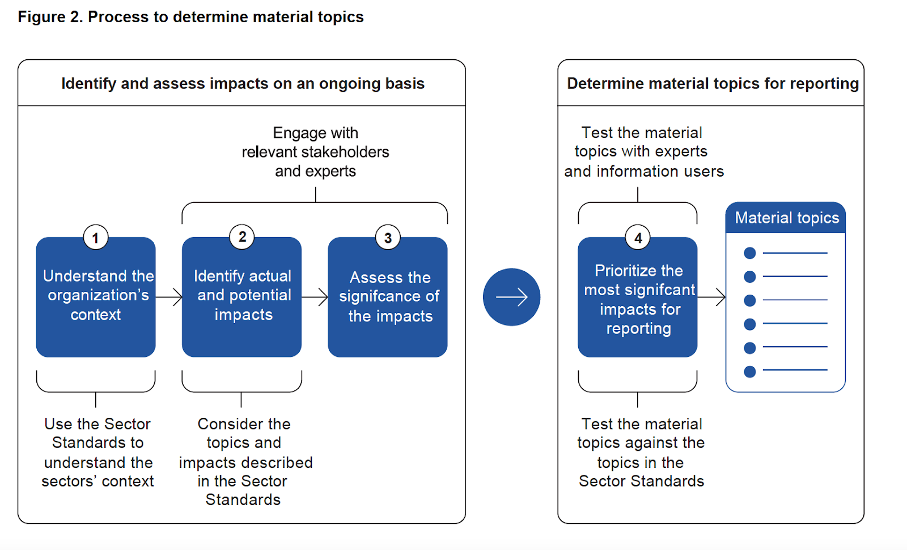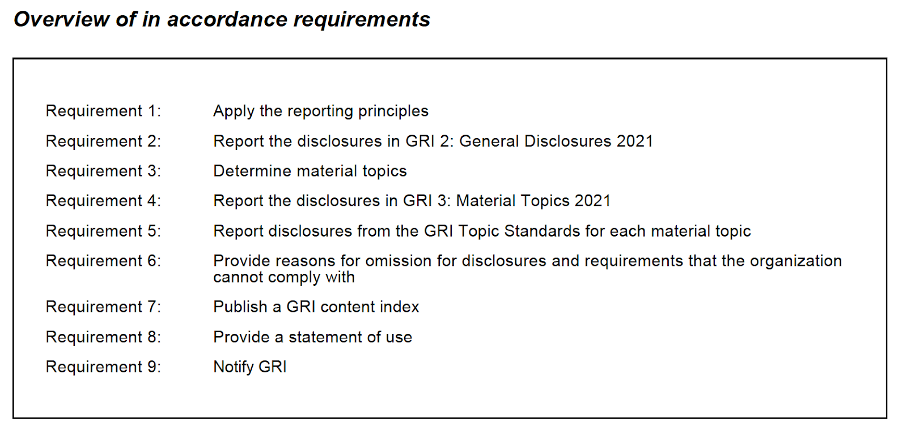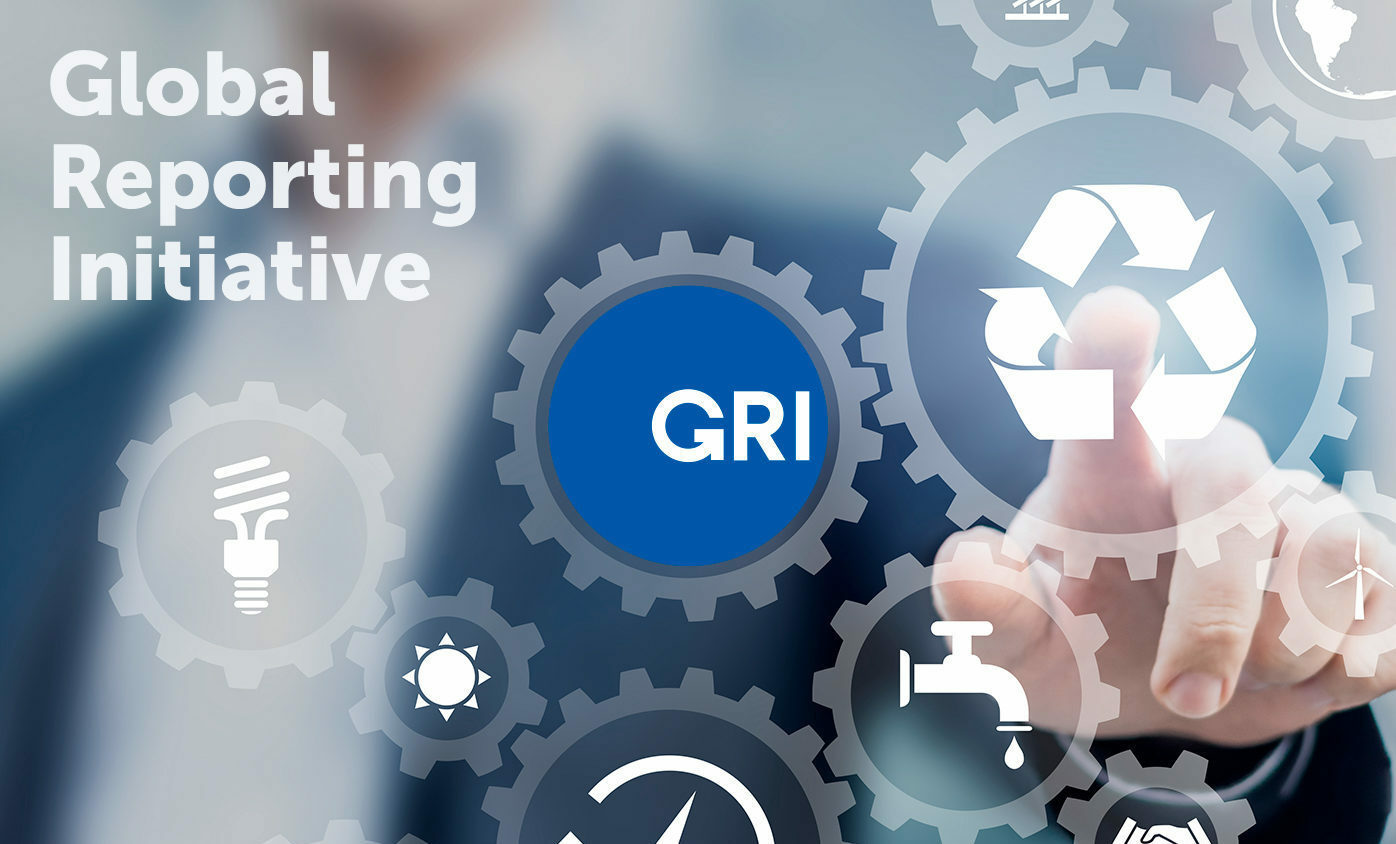This article was updated in May 2025.
So what are these changes?
1. New mandatory disclosures contained in new GRI standards
GRI’s 2021 update replaces the former GRI 101, 102 and GRI 103 with a new Foundation (GRI 1), General Disclosures (GRI 2) and Material Topics Disclosures (GRI 3). These new disclosures require that companies report on several aspects of their company value chain and governance, as well as their materiality process, including assessment of actual and potential impacts, stakeholder engagement and prioritization of topics, and a description of how the defined material topics are managed. In addition to mandatory disclosures, these documents also contain step-by-step guidance on how companies can carry out these processes.
Source: GRI 3: Material Topics 2021
2. A greater focus on human rights, due diligence and stakeholder engagement
GRI’s Universal Standards include minimum reporting requirements on human rights, due diligence and stakeholder engagement:
- Human rights: Based on the expectations of international organizations such as the UN Guiding Principles on Business and Human Rights, the new GRI standards require companies to state which policy commitments they have made regarding human rights, and how they have embedded these commitments into their business.
- Due diligence: Companies are expected to report how they perform due diligence to identify actual and potential negative impacts of their business, including their impact on human rights.
- Stakeholder engagement: Companies must describe which stakeholders and experts they have consulted in the process of defining their materiality.
3. The introduction of mandatory Sector Standards
GRI has introduced new Sector Standards that outline the likely material topics and associated disclosures for different business sectors. GRI requires that companies use Sector Standards when they are available in their sector. Companies using Sector Standards must include all the disclosures therein or otherwise give a valid reason for omission.
To-date, GRI has published four sector standards: Oil & Gas; Coal; Agriculture, Aquaculture and Fishing; and Mining. The organization aims to have a total of 40 sector standards. Currently the sector standard for Textiles and Apparel and Financial Services are being developed.
4. Updated Topic Standards
To align with the new Universal Standards, GRI has also updated their Topic Standards and eliminated the groupings of 200 (Economic), 300 (Environmental) and 400 (Social). There are now 31 separate Topic Standards that should be followed when reporting on Material Topics.
Companies are required to report all disclosures from the relevant Topic Standards related to the impacts they have defined in their materiality process. Disclosures can be omitted with an explanation.
5. Replacement of the “core” and “comprehensive” reporting options with a single “in accordance” option
In place of the previous “core” and “comprehensive” reporting options, which allowed companies to report at two different levels of adherence to the standards, the new GRI now simply allows companies to report either “in accordance with” or “with reference to” the standards.
Reporting “with reference to” the standards requires including a GRI index and GRI “statement of use” in the report and informing GRI that a report has been published. This option is chosen if the company is not able to comply with all nine of GRI’s reporting requirements, which include determining material topics, reporting disclosures for each topic and providing reasons for omission.
Reporting “in accordance” with the standards is more rigorous and provides a higher degree of credibility. It requires companies to follow all nine reporting requirements.

Source: GRI 1: Foundation
Conclusion: Get Prepared Early
Companies wishing to be in compliance with GRI must be aware of the requirements that have been in effect since 2023. In particular, it makes sense for companies to start thinking about their due diligence process regarding their business impacts—including on human rights—and their process for assessing material topics, including their engagement with stakeholders.
Becoming GRI compliant is good preparation for the EU’s ESRS, which will likely remain mandatory for the largest companies despite changes to the legislation brought by the EU Omnibus proposal in 2025, including a two year delay in reporting obligations. Smaller companies—even those that fall out of scope of the revised ESRS—will also find that GRI compliance will prepare them for reporting according to the VSME standards, according to which their corporate customers may request them to report. The GRI organization was deeply involved in the drafting of the ESRS and great efforts were taken to ensure that the two sets of standards are aligned, with a “GRI-ESRS interoperability index” even having been created to enable the compatibility of GRI and ESRS reporting.
While the EU Omnibus has thrown a dose of uncertainty into the mix when it comes to sustainability reporting in the EU, the GRI standards have been the most used sustainability standards for decades and offers a tried and tested approach that is almost certain to get companies prepared for what’s to come.


